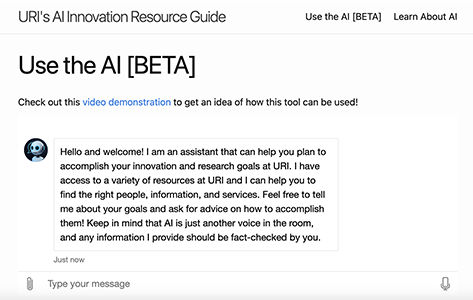
Jim McGwin
Adjunct Professor
College of Business
Jim is a ‘80 alumni at URI who has over 40 years of international industry experience and an adjunct professor for the College of Business.

https://brennan-infused.github.io/use-the-ai/
Introduction
Spotlight feature written by: Julia Malyuta
Jim McGwin is a ‘80 Alumni at URI. He is an adjunct professor for the College of Business who teaches INE249: Business of Innovation: Lean Startup, as well as a Volunteer Innovation Coach in the Library Innovation Labs. Jim also has 40 years of international industry experience. He has held senior positions at KPMG, Brown & Sharpe, and several successful startups. One of the startups that Jim mentioned includes UltraCision, which is a medical harmonic scalpel device company that was acquired by Johnson & Johnson. Additionally, Jim holds a U.S. Patent, has authored many industry articles, and co-authored a case study with United Space Alliance published in the European Union titled “Building the Knowledge Economy Issues, Application Case Studies.” Moreover, he assisted in the development of the Supply Chain Operations Reference Model (SCOR), was an early conference speaker at URI International Engineering Conference, and part of a number of new product development projects including one done in conjunction with the mid 1980’s URI Robotics Research. Jim has also guest lectured on Managerial Accounting at both URI and Salve Regina University.
With his years of experience, he has brought his expertise to URI to guide a joint student project with Infused Innovations and developed a proof of concept AI Chatbot. Infused Innovations is a technology advisory firm focused on helping organizations identify and explore emerging technologies to address their toughest challenges. Its mission is to collaborate on shaping the future through applied analytics, artificial intelligence, immersive experiences, and cutting-edge technologies that deliver lasting impact.
Jim, as well as the students involved in this project, also had the assistance of Karen Lokey, the Associate Director of Innovation Services, in technical coordination with Infused Innovations as well as her participation in engaging with students to give them her valuable feedback. Jim has also credited Heath Loder and Don Walker in the Library ITS for being fantastic in setting up the ChatBot in the ThinkLab located in the library.
“Artificial Intelligence is another voice in the room that needs to be challenged with separate trusted information and most importantly using human knowledge and wisdom.” – Jim McGwin
Teaching Tool Usage
“URI’s AI Resource Guide”, or the AI ChatBot project, is a tool that encapsulates the courses and resources that URI has to offer and makes it easy to access through the virtual assistance of AI. It can be utilized by potential students, current students, faculty, and administrators to get the information they need without having to scour the website to find it. The AI Chatbot primarily facilitates inquiries for course information, class schedules, available resources, and campus facilities making it easy to find. Some of the questions you can ask the AI are: “What courses are available for Computer Science majors?” or “When is the next math tutoring session?” and the Chatbot will provide information and include source links, making accessing needed information efficient.
When discussing the advantages and assets that this tool provides, Jim explains that accessibility is a main focal point of the tool. The AI ChatBot provides 24/7 access to course and resource information, allowing students to retrieve information at their convenience. Alongside accessibility was also efficiency. This tool allows students to quickly obtain answers to their queries without the need to search through multiple sources or wait for a response from human staff. Lastly, the AI Chatbot also has scalability as it can handle multiple user interactions simultaneously, accommodating a large number of students at once. But, most importantly, this tool exposes faculty, staff, and students to the beneficial uses of AI and may assist in eliminating any hesitation and worry that is commonly associated with AI. It teaches that AI can be used positively and helpfully and the AI Chatbot specifically demonstrates this by providing an up close experience of the positives it has.
However, with advantages also comes disadvantages. As the AI Chatbot is dependent on technology, if the tool happens to encounter technical issues or downtime, students may experience difficulties accessing the information they need. There also is limited understanding that comes with having a newly developed AI. The AI ChatBot’s responses may be limited to predefined knowledge, and it may struggle with complex or nuanced queries that require human intervention. Lastly, there is an initial development effort. With developing an AI ChatBot, it requires accurate and up-to-date information which means significant upfront investment in terms of time, resources, and content curation. In regards to the disadvantages, Jim notes that for faculty and staff members interested in using the AI ChatBot, it is crucial to continuously update the AI ChatBot’s knowledge base to ensure the information provided remains accurate and up to date. Additionally, faculty and staff should be prepared to offer supplementary support for more complex inquiries that may require human intervention.
Nevertheless, even with some negatives, a specifically designed university AI ChatBot offers several benefits and unique applications. Overall, it enhances student support and experience by providing immediate and personalized assistance. The AI Chatbot helps guide students through their academic journey and helps them navigate course selection, resources, and campus life. The tool also shows benefits by being a time-saver. With the tool allowing students to quickly find relevant information through one tool, it eliminates the need to search through various websites or contact multiple departments. The AI Chatbot also provides improved accessibility as it ensures equal access to course and resource information, which benefits students that may have different learning styles, abilities, or language barriers. Furthermore, the AI Chatbot also offers analytics and insights as it can gather data on frequently asked questions, popular resources, and areas of student interest, enabling universities to identify trends, improve services, and make data-driven decisions.
Video Demonstration
Student Experience & Feedback
While the AI ChatBot itself may not directly impact student achievement, it can significantly enhance the learning experience. By providing readily available information and resources in an easily accessible way, students are able to spend less time on searching for the information they need and more on utilizing the information and resources available in their academic career. By having quick access to course materials, schedules, and relevant resources, students can better manage their time, stay organized, and engage more effectively with their coursework, potentially leading to improved performance and academic success.
When it comes to student feedback about the use of the AI Chatbot, the general consensus has been positive. As the AI’s focus is to make finding and delivering information easier, students have expressed appreciation for the convenience and accessibility that the tool offers, as well as the prompt and responses to their inquiries. However, some students still may have a preference for human interaction as they may have more complex questions and needs, or may need more personalized assistance. “One of the purposes for doing this is to get people to see it, use it, and then know how to use it, and then accept it.”
Overall, the AI Chatbot will be a tool that would benefit the University as a whole as the deliverance of essential information becomes easier and with the tool being accessible not only online, but also in-person as this tool is broadcasted in the ThinkLab located in the library.
View Previous Ed Tech Faculty Spotlight with Erika Fiore on Notability
